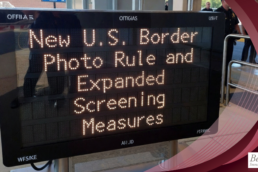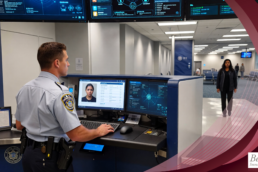With summer upon us, cross-border travelers can enjoy their trip by keeping these “DOs” and “DON’Ts” in mind.
DONT be disrespectful. When approaching inspection, each individual should have their passport or travel document ready to hand to the CBP Inspector, as well as proof of vehicle registration. Phone conversations should be ended prior to entering the inspection area and passengers should give their full attention to the officer. You should remove your sunglasses, roll down all your windows, and turn off the radio.
DO be truthful. CBP officers are highly trained individuals who can read your body language, and they can easily tell when you purposefully evade their questions. Do not act confused or unsure – give the officer brief and direct answers to his or her questions. You should anticipate being asked to declare any items (and money amount) you are bringing into the U.S, as well as the purpose of your trip, the duration of your visit, and accommodations for your stay.
DONT be surprised by your own belongings. Know the contents of your vehicle (especially the trunk!) and your luggage. Whenever possible, leave any unnecessary items that may be the source of extra questioning and processing time at home. Do not attempt to bring food, plants, alcohol and tobacco, rifles and other weapons, and even firewood into the U.S. from Canada.
DO have documentation for children under age 16. Parents/guardians traveling with minor children and infants are required to provide proof of citizenship for each child, such as the original or copy of the Birth Certificate, Naturalization Certificate, or Citizenship Card. If both parents/guardians are not traveling with the child, you must have proof of custody, or written authorization from the non-traveling parent(s) with their contact information.
DONT bring your pets without doing your research. If you plan to take your pet abroad or import one on your return, review a copy of the CBP brochure Pets and Wildlife found on their website.
DO yourself a favor and check Border Wait Times at your intended port of entry. This information is updated hourly on the CBP website and can be useful in planning trips. Build extra time into your travel plans for exceptionally heavy traffic around the holidays (i.e. Labor Day, Canada Day, Independence Day, and adjacent weekends).
DO consider applying for an advanced travel document. Motorists possessing Radio Frequency Identification (“RFID”) technology-enabled passports, enhanced drivers licenses, and NEXUS, SENTRI, or FAST program cards have the advantage of an expedited inspection process offered through exclusive traffic lanes at border crossings. Consider applying for one of these documents through the CBP website.
DO cooperate. Understand that CBP officers have the authority to conduct enforcement examinations without a warrant, which can range from a mere peek inside your car to examining one piece of luggage to a full personal search. You should expect a thorough inspection process when entering the U.S. from Canada regardless of traffic.
If you have any questions about crossing the border, contact Berardi Immigration Law today at 1-877-721-6100.
Ready to have Berardi on your side?
Whether you’re a business looking to hire or a professional hoping to relocate, immigration law can be complicated. But you don’t have to do it alone. Put our experience to work for you.


